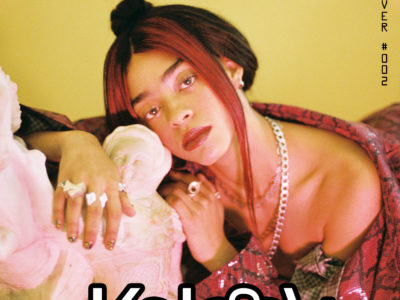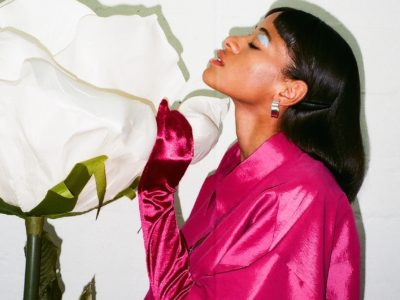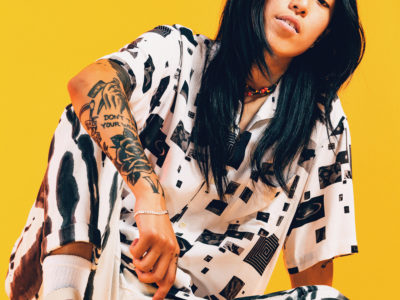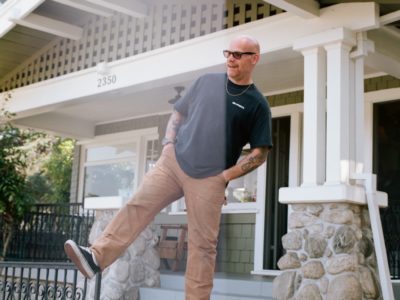Yumna Al-Arashi, Photographer + Storyteller
PHOTOS BY: LYKA

Feature
Fresh off her New York and Los Angeles “Shedding Skin” gallery shows, Yumna takes us into her world of forward-thinking photography and unveils a depth of social awareness we lusciously soaked up in every one of her words and art—all at the tender age of 28.
The Interview: Get to Know Yumna
INTERVIEW BY: ZARNA SURTI
When you first meet Yumna, there’s a quiet strength you can feel all around her. She’s taken an unconventional route filled with social responsibility—one many young women her age would shy away from. She’s not enveloped in social media or like counts every second of the day—she’s a global storyteller with a perspective that remains close to her heritage and heart. She explores what it’s like to be a Muslim-American woman and tells stories for women who don’t have the reach to showcase their perspectives. Meeting with her at a quaint cafe in her old neighborhood of Los Angeles’s Silver Lake, I learned what it was like to step into her world—and it was equally as beautiful as it was eye-opening.

Growing up with an open-minded father who also happens to be a Yemeni diplomat, Yumna remembers the freedom to explore her body—her father didn’t care if she was “running around butt naked in the yard,” or not covering her hair as a young Muslim girl. She remembers him saying she had the right to do whatever she wanted with her body, and with that freedom came her ability to create and explore worlds some first-generation children rarely get to partake in, like photography. When I ask her what first got her into photography, she provides an unusual response—credit card rewards, remembering, “Back in the day, they’d send you pens or weird things, but my dad got a digital camera once and it was the shittiest piece of shit—you could take like seven photos on it and there was no LCD screen!”
I didn’t want to assist anybody, I didn’t want to work at a studio, and I definitely didn’t want to work as a little bitch—I knew I was more than that.
That little camera sparked her passion in photography and eventually led her to school in New York, followed by freelance journalism in the Middle East where she developed her first book, and then back to New York. But she wasn’t as enthralled with New York after her escape to the Middle East saying, “I was really feeling the burn of New York. Unless you were Terry Richardson at the time, you weren’t going to make it as a photographer and I didn’t want to assist anybody, I didn’t want to work at a studio, and I definitely didn’t want to work as a little bitch—I knew I was more than that.” This confidence broke her out of New York and onto an exploration in Los Angeles, where she luckily landed a cheap room to stay in at a friend’s house and also where she started to plot her next move.
What eventually came next was her latest gallery exhibition “Shedding Skin,” which she recently showed in both New York and Los Angeles. It’s a beautiful photo and film story of women in hammams (also known as communal baths), that show a side of Arabic women we’re not normally used to seeing. The hijabs and covered bodies many photographers choose to display are replaced with beautifully exposed bodies, dark lighting filled with warm skin tones, and an almost paint-like approach to the composition. The women are intertwined with each other and there’s water cleansing not only their skin, but also their souls. There’s also an overwhelming undertone of self acceptance, womanhood, and the beauty of being present.

The concept for the show came from an experience Yumna had in Tunis where she went to the “craziest hamman,” remembering it being filled with all types of women who were screaming and shouting and splashing water. She’d been in hammams her whole life, but this one was different. Not only was she visually stimulated, but she also felt the experience of spa culture is one that women all over the world can relate to, not to mention it’s something that’s existed since the beginning of history. It’s a place where women “never have to think about our bodies or all the shit that men put on us and that society puts on us.” She also believes it to be the time when we’re “closest to the earth—because we’re naked.”
Along with this closeness to the earth comes Yumna’s ability to connect to the earth through her travels. She’s lived everywhere from New York to Los Angeles and now resides in London, but with the constant traveling and freedom to tell stories come the difficulties all young entrepreneurs face. Yumna primarily focuses on grants to create her art, which is basically a “full-time job.” Her advice? Work hard. “Look, it’s not easy. It’s not fucking easy. And I am very easily mistaken to be well off financially—but I’m not. I struggle every fucking day and people think I’m a crazy person because I’m alone and I’m the one fighting for myself between corporations and agencies and I have to be the person who stands up for myself to get money to survive.” She’s also found a huge strength in leading her own charge saying, “In order for you to make any sort of money, you have to stand up for yourself, and you have to fight, and you have to be that diva everyone fucking hates, because at the end of the day, you’re making them money too.”
In order for you to make any sort of money, you have to stand up for yourself, and you have to fight, and you have to be that diva everyone fucking hates, because at the end of the day, you’re making them money too.
Although her strength and creative perspective allow her to connect with a supportive worldwide community, Yumna has also received backlash for the work she creates. She’s had death threats, rape threats, and “everything else you could possibly imagine.” For a series she worked on recently, a German man sent her an email with a Google screenshot of where he thought she lived saying, “Stop defending these women, you’re just as bad as the Islamists that are forcing them to cover themselves in the first place! You better watch where you sleep tonight.” These threats have only charged her mission in photography and social awareness, and Yumna proudly says, “Everything I do is a huge puzzle in putting together stories that help us understand why the Muslim woman got to where she is now. It’s very easy for people to think that these cultures have always been oppressed or that they always been one-dimensional—and in reality, nothing is that way.” From working on her first book “I Am Not A Machine,” a project that spanned over five years where she undocumented men living in migrant labor camps in UAE, to working on her upcoming project on the last generation of Muslim women with facial tattoos, Yumna has always had a strong backbone to everything she does—something you don’t see much in the age of social media.

When I ask her about the pressure she feels to empower young women, she explains that there’s no need for women to exploit themselves sexually or dumb themselves down. “We need to teach younger girls who are following us, especially those of color, that you don’t need to stick out your tongue and be like Miley Cyrus—you don’t need to emulate a sexual white girl. Stand up for yourself. Be yourself.” This confidence and the fact that Yumna doesn’t need to be like every other girl on Instagram leads her to say, “You don’t need the likes, you have a responsibility. It’s our responsibility to take ownership of ourselves and our bodies right now and not allow Instagram to take hold of us and allow us to be these very self addicted girls—it makes no sense.”
We need to teach younger girls who are following us, especially those of color, that you don’t need to stick out your tongue and be like Miley Cyrus—you don’t need to emulate a sexual white girl. Stand up for yourself. Be yourself.
Through her socially responsible behavior and her culturally-rooted art, Yumna is quickly becoming the voice of a generation of young women who need to heard. As we’re finishing up coffee she looks at me with her confident eyes and says, “There are a lot of women like me who don’t talk about what it’s like to have the experience of being a Muslim-American or an Arab-American or a brown-American or a first-generation America. A lot of women are afraid to talk about it. I’m a loudmouth, and I say what I need to say always, and I never back down, and I always, always encourage space for conversation and thought.” We can’t wait to see what conversation her work leads us to have next.
The Exhibition: Shedding Skin
Yumna showed her latest project in both New York and Los Angeles in collaboration with ASOS Supports Talent. Check out photos from both shows above.





































